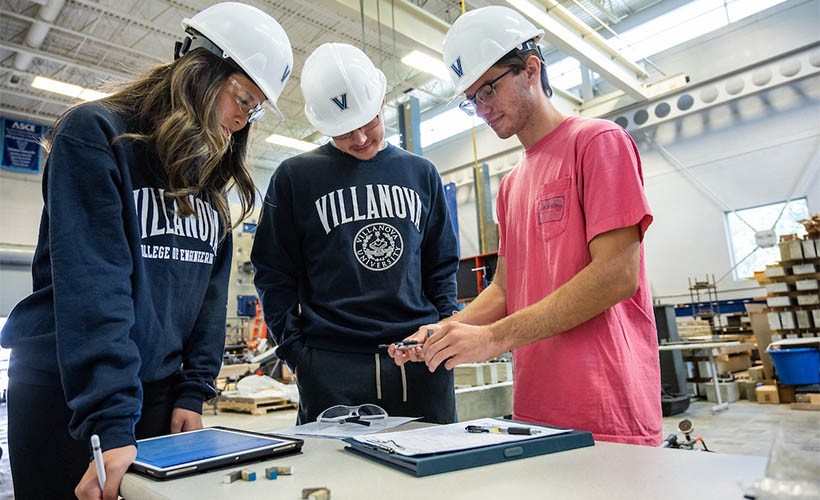BACHELOR OF SCIENCE IN CIVIL ENGINEERING

The Department of Civil and Environmental Engineering offers a full-time academic program leading to a Bachelor of Science in Civil Engineering in 4 years.
A student may also be able to obtain a bachelor’s degree and a Master of Science degree in Civil Engineering or Water Resources and Environmental Engineering in 5 years.
What is Civil and Environmental Engineering?
Civil engineers design, construct and protect the physical and natural built environment, including roads, bridges, canals, dams, buildings and water treatment plants. Civil engineers are needed to provide the world with clean water and safe infrastructure. At Villanova University College of Engineering, faculty in the Department of Civil and Environmental Engineering prepare students to play a vital role in improving quality of life while protecting the environment.
Why Villanova?
What makes Villanova’s Civil and Environmental Engineering department unique is our commitment to community:
- Between students who learn teamwork, communication and problem-solving skills together during classes and in clubs
- With faculty who value your success and take the time to get to know you—by name
- In the world outside of Villanova, where we engage in service learning trips, study abroad experiences and STEM outreach programs
- Through Nova Nation whose alumni are there to mentor, guide and support our students during their time here and after they graduate
Areas of Study
All undergraduates in Civil and Environmental Engineering are introduced to the following specialty areas. Students must take a course in at least three of these areas as technical electives:
- Environmental Engineering
- Geotechnical Engineering
- Structural Engineering
- Transportation Engineering
- Water Resources Engineering
- Construction management
Related minors—including Real Estate Development (offered in partnership with the Villanova School of Business) and Sustainable Engineering—offer an opportunity for more in-depth study.
Research Opportunities
In addition to a senior capstone design project, students may take a course of undergraduate research where they work directly with a faculty advisor and a graduate student mentor and receive academic credit.
Recent undergraduate projects include:
- Evaluating cyclical performance of wood framed shear walls with viscoelastic materials
- Determining influence of control devices on the performance of constructed wetlands
- Investigating reclaimed asphalt pavement properties for sustainable infrastructure
- Providing structural and site design for an outdoor auditorium for an orphanage in Honduras
- Conducting a complete safety analysis of a regional dam
After Earning Your Degree
Civil engineers and environmental engineers regularly appear on U.S. News and World Report's list of the "100 Best Jobs in America" and “Best STEM Jobs.”
In 2020, 23% of Villanova Civil Engineering graduates continued their education after graduation. Those who entered the job market found opportunities in civil engineering, consulting, construction/contracting and project management.
Where Are They Now?
2020 graduates from Villanova’s Civil and Environmental Engineering program are working in a number of fields in a variety of unique positions. Here is just a sampling:
- Entry Level Geotechnical Engineer, AECOM
- Structural Engineer, Alfred Benesch & Company
- Civil Engineer, Alta Design
- Staff Engineer, Bohler Engineering
- Sea Turtle Specialist, Broward County Sea Turtle Conservation Program
- Associate Consultant, Capco
- Advisory Analyst, Deloitte
- Water Resource, EIT, Jacobs Engineering Group
- Junior Hydraulic Staff Engineer, Massachusetts Department of Transportation
- Project Engineer, Whiting-Turner Construction Company
- Field Engineer, Turner Construction Company
- Engineer, UGI Utilities
- Engineering Technician, Van Cleef Engineering Associates
- Water Resources Engineer, Whitman, Requardt and Associates
